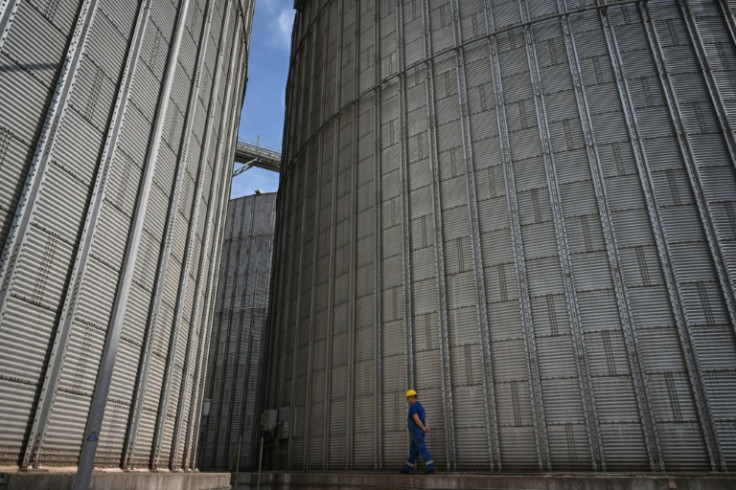Russia Planning Sea Mine Attacks on Civilian Ships to Stop Ukrainian Grain Exports
A new British intelligence report exposes Putin's plan of "weaponising food" by launching sea mine attacks on civilian ships carrying Ukrainian grain in the humanitarian corridor created in the Black Sea.

Britain has revealed that Russia is planning to use sea mines on civilian ships to stop Ukraine from exporting grains.
This comes at a time when the world is reeling under a hard-to-contain global food inflation due to the effects of Russia's withdrawal from the black sea grain deal earlier this year.
On Wednesday, October 4, the UK Foreign Office said that British Intelligence has reported Russia might be targeting civilian ships in the Black Sea with sea mines.
Since the start of Russia's Invasion of Ukraine, Russia has destroyed enough grains that could have fed over a million people for a year, said the Foreign Office. According to Britain's assessment, Russia will pass on the blame to Ukraine for this.
This comes at a time when Russia declared it had intercepted an army of Ukrainian drones and threatened Ukraine with nuclear attacks.
Early in July, Britain increased support for the most vulnerable people in the world after Russia withdrew from the Black Sea Grain Initiative.
Similar declassified reports from the British Intelligence pointed towards Russian missile strikes on cargo ships in the Black Sea. New reports declassified on Wednesday, added to that as the Russian military is continuing its attack on Ukraine with plans of fresh attacks on civilian ships.
The Russian military aims to jeopardise the "humanitarian corridor" set up in the Black Sea for the safe passage of ships carrying grains, as the Russia-Ukraine continues. Through the sea mine attacks in the humanitarian corridor, Russia seeks to deter Ukraine from exporting grain, according to British Intelligence.
The Foreign Office revealed that Russia doesn't want to openly sink non-military ships in the Black Sea. Rather it seeks to deploy sea mines and shift the blame on Ukraine. This is part of Russia's strategy to keep the Ukrainian economy under pressure.
The Foreign Office said they are releasing this declassified report by British Intelligence to expose Russia's plans and prevent such attacks from happening.
Britain is working with Ukraine and other partners to ensure safe passage of ships in the black sea. However, the UK government isn't changing its directives for UK shipping companies. All Ukrainian ports and waters are on the highest possible alert level because of threats from Russia.
At present, Britain is monitoring Russian military activity in the Black Sea with all its intelligence, surveillance and reconnaissance capabilities, and will continue to do so. This is done to detect any threat to Ukrainian shipping and infrastructure, said the Foreign Office.
The UK government stressed its commitment to help Ukraine export its agricultural produce along appropriate routes like the humanitarian corridor in the Black Sea, the Danube and the overland.
Britain said it would work with international partners and Ukraine to ensure safe passage of grains. In the recently concluded G20 Summit in Delhi, the British Prime Minister Rishi Sunak announced £3 million support to the World Food Programme for delivering Ukrainian grains to the poorest in the world.
Earlier the UK contributed to President Volodymyr Zelenskyy's 'Grain from Ukraine' initiative.
Russia's withdrawal from the Black Sea Grain is preventing 24 million tonnes of food from Ukraine from reaching global markets this year. Before Russia's Invasion of Ukraine, 400 million were fed by Ukrainian grains.
Nearly 10 per cent of global wheat exports come from Ukraine while 12 per cent of corn and barley in the world are of Ukrainian origin.
In 2022, 50 per cent of wheat given to the World Food Programme (WFP) came from the Black Sea Grain Initiative. With Russia blocking Ukrainian grains the WFP has to source low-quality, expensive wheat from elsewhere.
Sea mine attacks on civilian ships to weaponise food?
Speaking about the matter, UK Foreign Secretary James Cleverly said the Russian military's plan of targeting non-military ships in the Black Sea shows Vladimir Putin's disregard for civilian lives.
This also demonstrates Putin's disregard for the problems faced by the world's most vulnerable, said Cleverly.
The Foreign Secretary termed these new plans by the Russian military "part of a wider pattern of Russian aggression in the Black Sea" as the country has been systematically targeting Ukrainian ports and civilian infrastructure since July.
The world can see through Russia's cynical attempts to frame Ukraine for its acts and Britain stands united with its allies to fight against Putin, said Cleverly.
The Foreign Secretary labelled the new plans of sea mine attacks on civilian ships as Putin's attempt to weaponise food and innocent trade as it blocks food from reaching markets and vulnerable people.
So far, Russia has damaged 130 Ukrainian port facilities in Odesa, Reni and Chornomorsk, since it withdrew from the Black Sea Grain deal. This has led to the destruction of 300,000 tonnes of grain which is more than it promised to donate to African states. This could feed over 1.3 million people for a year.
© Copyright IBTimes 2025. All rights reserved.






















